|
With South Africa in the throes of Covid-19’s second wave and the potential of another lockdown, the Institute of Risk Management of South Africa wants to support effective risk assessment and proactive decision-making by the government and private sector.
Christopher Palm, Chief Risk Advisor at IRMSA, says that the question about whether we cancel Christmas or save the economy isn’t clear-cut and that the threats and opportunities need to be carefully weighed in a very complex context to find the right balance for the country. Protecting your livelihood versus protecting yourself from the virus “While we have seen positive indicators in the last three months, such as the strengthening Rand against the Dollar, South Africa's current account balance shifting to a surplus of R297.5 billion in the third quarter and a rise in confidence in the retail sector, it is doubtful that South Africans have the resources to absorb the economic impact of another lockdown,” says Palm. Palm says people aren’t adhering to Covid-19 restrictions, which is evidennot only in the rise in positive cases in the country but can be seen through everyday activities. With the expanded definition of the unemployment rate approaching 50%, many South Africans will have to decide between protecting their livelihood or protecting themselves and their loved ones against Covid-19 should another lockdown be enforced on the public. “Shopping centres are full, holidaymakers are in full-swing, and rapid spreading events among school-aged children continue to be noted in the media. Our hospital system is at capacity, at least the emergency services and front-line health care staff. Not only is there a risk to public health, but the risk of systemic fraud and corruption with regards to the funding being diverted to address the needs of people at a community-level will continue to rise,” sas Palm. Scenario planning and systems thinking based risk assessments are needed “IRMSA will be hosting a free webinar on 15 December to give leading experts in futures thinking, medicine and business the opportunity to present key insights that could help treat the three biggest risks of a second harsh lockdown, namely social unrest, an increase in crime, and the larger impact on business and unemployment,” says Palm. Popular radio host, Jeremy Maggs, will be facilitating the webinar, which has already seen many sign-ups despite being a day before a public holiday and when most people traditionally go on leave in December. The panellists include Mr Ndabo Khoza, CEO: Ushaka Marine World, Professor Ian Sanne, Infectious Diseases Doctor, Associate Professor: Wits University, Mr Graeme Codrington, Futurist: TomorrowToday Global, Mr Dharashan Naidu, Human Resources and IT Management Professional: Coastlands, Dr Azar Jammine, Director and Chief Economist: Econometrix and Mr Mzimkulu Msiwa, Chairperson: Provincial Planning Commission. The webinar aims to allow thought leaders to present balanced views and discussions surrounding potential scenarios that may play out should the country go into a second lockdown. The outcome of the webinar is to facilitate alternatives in support of making effective decisions in a complex, fast paced environment and highlighting the risks to the country and economy. Also spotlighting in particular, potential opportunities, and the actions that need to be taken to respond to these risks. “Instead of answering the question of whether South Africa should cancel Christmas or save the economy, the IRMSA will explore a third option, namely carefully balancing these two options to enable better decision-making that is supported by risk response strategies,” concludes Palm. ENDS MEDIA CONTACT: Rosa-Mari, 060 995 6277, [email protected], www.atthatpoint.co.za For more information on IRMSA please visit: Website: https://www.irmsa.org.za/ Twitter: https://twitter.com/IRMSAInsight Facebook: https://www.facebook.com/IRMSAInsight/?ref=hl LinkedIn: https://www.linkedin.com/company/irmsa-institute-of-risk-management-sa/
0 Comments
Authored by: Jonathan Crisp, Risk Intelligence Committee Member at The Institute of Risk Management South Africa
In speaking to Junaid Amra, head of the Forensics Technology Solutions division at PwC, it is somewhat terrifying to hear the extent and sophistication of organised cyber-crime, and that it is on the increase. This, at a time when the world is reeling from the effects of COVID-19. PwC has various business units within their forensics technology division ranging from eDiscovery, search and seizure operations, data analytics, threat intelligence (which includes the monitoring of social media and the underground dark web) and an incident response team. A shocking fact is that at the time COVID-19 struck, medical facilities were targeted aggressively by cyber criminals. One of the first recorded incidents was a medical facility in Prague where cyber criminals targeted a COVID-19 testing centre and disrupted operations. What was interesting however, is that as cyber criminals and all their loved ones fell ill, the conversations on the dark web changed to being unacceptable to target medical facilities; so the demand for stolen medical data dropped as certain sites refused to publish the information and holding medical care facilities ransom decreased significantly. Cyber threats can be categorised as follows:
In our own country, cyber hacking of high profile politically exposed individuals remains a huge threat. Imagine how advantageous it is for corrupt individuals files to just disappear or be amended ‘appropriately’. At a time when our country is being sunk by the corruption of unscrupulous individuals, now more than ever we as civil society require justice and transparency, which requires the protection of and integrity of our state systems and information.
This was based on leaked information posted by attackers. These sectors are easier targets compared to the financial sector since they traditionally do not invest as heavily in cyber security as the financial sector. As result of COVID-19, there has been less demand for stolen credit card details due to the slowdown in international travel. PwC recently analysed the top 250 emerging technologies and have come out with a list of 8 technologies that they believe will be the most transformative to organisations in the next 3 to 5 years. The 8 transformative technologies are:
In summary, the convergence and timing of the following events, if not managed effectively, may contribute to a ‘perfect storm’ and destroy an organisation:
MEDIA CONTACT: Rosa-Mari, 060 995 6277, [email protected], www.atthatpoint.co.za For more information on IRMSA please visit: Website: https://www.irmsa.org.za/ Twitter: https://twitter.com/IRMSAInsight Facebook: https://www.facebook.com/IRMSAInsight/?ref=hl LinkedIn: https://www.linkedin.com/company/irmsa-institute-of-risk-management-sa/ President Cyril Ramaphosa, as chair of the National Command Council established under the Disaster Management Act, will tonight be honoured by the Institute of Risk Management South Africa (IRMSA) for the impact the Risk Adjusted Strategy had on responding to the enormous risks posed by the Covid-19 pandemic on the country and its people.
Jackson Mthembu, Minister in the Presidency, will accept the Risk Influencer of the Year Award on behalf of Pres Ramaphosa during the annual virtual awards ceremony. Broader recognition IRMSA introduced the Risk Influencer of the Year Award three years ago in recognition of individuals or organisations in business or government who are not risk professionals, says Gillian Le Cordeur, CEO of The Institute of Risk Management South Africa. “However, their understanding of the importance of risk management impacts directly on the work that we as risk professionals do. It elevates the role of the institute and the importance of effective risk management.” Throughout the year the IRMSA board considers any individual or organisation that has influenced or impacted business or society through their leadership role and the promoting of the value and importance of risk management. Unanimous decision The Risk Adjusted Strategy implemented by the President and his council received the unanimous vote from the IRMSA Executive Committee. The strategy has made the biggest impact during an extraordinary moment in our country, says Le Cordeur. The strategy considered the impact of the coronavirus and developed measures in which business, the economy and individuals could navigate the risks associated with the coronavirus. Elevate communication The institute was able to elevate its communication and advice with government on the risks posed by the virus. “We are delighted with the fact that the Presidency, as a corporate member of IRMSA, acknowledged the role of risk management through its Risk Adjusted Strategy and the role risk management plays, whether it is a pandemic or a process or any other risk facing the country,” says Le Cordeur. Previous winners Since the inception of the award prominent leaders such as Clem Sunter, South Africa’s most highly regarded scenario planner and strategist, received the award for integrating risk management into his approach to scenario planning and actively involving and supporting the risk profession in that regard. The King Committee received the award for the King IV Code that highlighted the role of risk management in governance. Last year the Risk Influencer of the Year went to Chief Justice Mogoeng Mogoeng, for his active role in promoting the importance of risk management for South Africa ensuring that we respond to the right opportunities, highlighting new risks as they emerge whilst managing those that already exist. Also, for putting those significant risks our country faces in the spotlight. Risks like greed, corruption, climate change, leadership and crime, to name a few. ENDS MEDIA CONTACT: Rosa-Mari, 060 995 6277, [email protected], www.atthatpoint.co.za For more information on IRMSA please visit: Website: https://www.irmsa.org.za/ Twitter: https://twitter.com/IRMSAInsight Facebook: https://www.facebook.com/IRMSAInsight/?ref=hl LinkedIn: https://www.linkedin.com/company/irmsa-institute-of-risk-management-sa/ The Institute of Risk Management South Africa (IRMSA) says that its annual Risk Report, due to be launched in February 2021, will be one of its most important yet.
Published annually, IRMSA’s Risk Report is widely seen as the definitive examination of the risks faced by South Africa and the organisations that operate within its borders. Christelle Marais, Vice President of IRMSA and the Chair of the Risk Intelligence Committee, says that the 2021 report will focus on lessons learned from the COVID-19 crisis for the risk management discipline. “Most organisations had a pervasive risks such as a pandemic on their risk registers, but few, if any, anticipated the real extent of the risk it actually posed,” she explains. “Because the world is so interconnected, the real issue is not the pandemic risk as such, but rather similar risks that could materialise in an equally far-reaching manner. Our risk report strives to answer the question: What do we as a country and as individual organisations need to be doing to deal with systemic risks of this scale?” Last year, IRMSA introduced some major methodological changes to its report, designed to make it more useful to risk decision-makers outside of the risk management discipline and to address the concerns of CFOs and COOs more directly. This approach will be continued this year, with the JSE assisting IRMSA to connect with decision-makers in the private sector; a wide range of public-sector decision-makers will also be included. “Our aim is to ensure that this report will help organisations not only understand the risks they face, but also to see their risks within the context of the sector in which they operate and the national and global socio-economic contexts, as well,” Ms Marais says. The 2021 report will be divided into five sections that take readers on a journey. Section 1 will incorporate insights from top South African leaders in the private and public sectors, small-medium enterprises and non-profits. Section 2 will examine the scenarios that South Africa is facing, and will provide a discussion about systemic thinking and risk appetite. Section 3 will then examine each of the identified risks in detail. While some of these risks will naturally have been carried over from last year, new ones will also feature—for example, the risk that COVID-19 has changed consumer behaviour for good. In the final two sections, the report will identify the competencies that South Africa as a country as well as South African organisations will need to succeed. Qualitative input will be sourced from C-Suite leaders via a survey, and highly specialised qualitative analysis will be used to generate useful insights. The report will culminate in a call to action for all to collaborate as we build a risk resilient country. “Each time a risk materialises, we learn more about what risks means in a world that’s increasingly complex,” Ms Marais concludes. “The IRMSA Risk Report is required reading in a world that is increasingly uncertain and in which the effects of risk are increasingly difficult to predict.” ENDS MEDIA CONTACT: Rosa-Mari, 060 995 6277, [email protected], www.atthatpoint.co.za For more information on IRMSA please visit: Website: https://www.irmsa.org.za/ Twitter: https://twitter.com/IRMSAInsight Facebook: https://www.facebook.com/IRMSAInsight/?ref=hl LinkedIn: https://www.linkedin.com/company/irmsa-institute-of-risk-management-sa/ Authored by: Nishkar Ballasur, IRMSA Risk Chat Contributor
Over the recent period, there has been much conversation about the 4th Industrial revolution and its impact on industries and the resources that work within. This conversation continues and has intensified given the COVID-19 pandemic impact on the world which has thrust organisations into not just speaking about working in the digital age but rather enabling people, processes and systems to now continue operations with a strong digital presence. These conversations, in most cases, were supplemented with multiple pleas made to employees to ensure that they embrace this new revolution by enhancing their knowledge and skills. This is probably and arguably one of the most recently and frequently mentioned encouragement notes made from line management to direct reports. A key observation to note though is whether the employee knows what he/she needs to do to upskill themselves to remain relevant? The current risk practitioner faces the same challenges in that they have been informed and are aware that they need to re-armour themselves to operate within the new challenging environment however is there what I refer to as a “bridge”? Is there a learning map, guide, curriculum or similar that the risk practitioner can follow to help transform him/her into the digital risk manager? A simple analogy to serve as reference is requesting a new employee to begin a new piece of work without providing him/her with the guidance or tools to do so, it is simply not enough to just inform, enablers must exist for effective development and execution. Many opinions exist on what knowledge and skills the risk manager of the future is required to obtain, in this article I refer to this role as the digital risk manager, however there could be various title interpretations across organisations. Simply positioned, this refers to the risk manager of the future. In my opinion, this role is not similar to the IT Risk and Information Security Risk practitioner roles as these roles are normally more technical in nature; the digital risk manager role is intended to obtain sufficient and relevant competencies to understand and operate within the technology domain by bridging the gap between business and technical acumen and allowing them the opportunity to branch full time into a more technology risk role should their career path dictate. Following below, I have expressed my opinion of what I believe are the top 10 competencies required for the digital risk manager/risk manager of the future. I further recommend that specific courses within these competencies be sought after. Competency levels can range from basic, intermediary to advanced, it is up to you as to how far you wish to develop your knowledge and skill level. Top 10 Competencies Required for the Digital Risk Manager Competency 1 – IT 101 Obtain an understanding of information technology concepts such as hardware, software, databases, operating systems, applications, networking and similar. Competency 2 – Data Analytics/Big Data Obtain an understanding of data, information, insights, analysis and reporting tools, data interrogation and similar. Competency 3 – Phyton Programming In my opinion, it is not essential that a digital risk manager be able to perform programming however it is extremely useful for (i) providing logical and structured thinking skills and (ii) creating excitement and enjoyment when viewing how a program is created from infancy to product level. Competency 4 – MS Office 365 Understanding the MS Office 365 toolset allows the digital risk manager to suggest solutions to business problems and allows for efficiencies to be created within current processes. Competency 5 – Robotics Obtaining an understanding of the robotic process automation process and the various tools that exist to develop robots (automation of processes). The digital risk manager does not need to know how to develop a robot using a particular software tool however if the interest exists, it’s a very useful aid in his/her armoury. Competency 6 – Cyber Obtaining an understanding of the cyber space along with touchpoints to the other risk types. Competency 7 – Blockchain and Cryptocurrencies Obtaining an understanding of the definitions thereof and the potential threats to and opportunities for business. Competency 8 – Agile/Innovation/Invention Obtaining an understanding as this will enable risk practioniers to look inwards to determine where this can be applied to optimise risk processes and delivery to our customers (internal and external). This helps promote innovative thinking on process and product improvements. Competency 9 – FinTech/RegTech Obtaining an understanding of the concepts and industries impacted including risk and opportunity. Competency 10 – Soft Skills Although being the last item listed, certainly not the least important, soft skills are critical especially during an age of robots where we do not wish for humans to behave in the same way as robots do thus making this the major differentiator in the modern world. In addition to my suggested top 10 competencies, a reminder to take reference from the World Economic Forum (WEF) and its’ top list of skills required for the fourth industrial revolution, these being:
Still, we need to begin the journey and cross the bridge but must also remember that there is no destination, the bridge will continue to expand as our destination changes with time. The major principle remains, a bridge must exist to help move us to the changing landscape! ENDS MEDIA CONTACT: Rosa-Mari, 060 995 6277, [email protected], www.atthatpoint.co.za For more information on IRMSA please visit: Website: https://www.irmsa.org.za/ Twitter: https://twitter.com/IRMSAInsight Facebook: https://www.facebook.com/IRMSAInsight/?ref=hl LinkedIn: https://www.linkedin.com/company/irmsa-institute-of-risk-management-sa/ 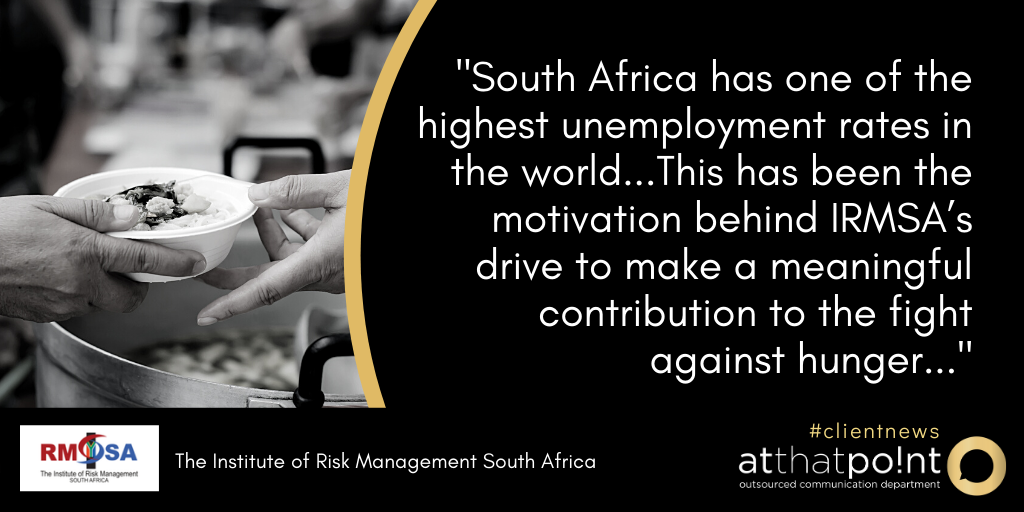 South Africa has one of the highest unemployment rates in the world, with many being unable to provide for their families. This has been the motivation behind The Institute of Risk Management South Africa’s (IRMSA’s) drive to make a meaningful contribution to the fight against hunger and food scarcity. The institute has indicated that it realised the risk that food insecurity poses to the South African business landscape and felt responsible to be part of the solution. Choosing a food champion On World Food Day earlier this month the impact of Covid-19 and the emerging risk of food scarcity were driven home more profoundly than ever before, says IRMSA. The institute, together with nine other organisations including the Institute of Directors South Africa (IoDSA), the Association of Certified Fraud Examiners South Africa (ACFESA), the Corporate Counsel Association of South Africa (CCASA), the Compliance Institute of Southern Africa (CISA), and the Financial Planning Institute (FPI), have continued with their relationship with FoodForward SA as their champion to collect, store, preserve, package and distribute meals to the vulnerable during this time. Millions are food insecure Judging from the number of people that have become unemployed in the first and second quarters, FoodForward SA estimates that 30 million people are food insecure. This means they are not getting regular access to safe and nutritious food. “There are no easy fixes to the current threats posed by poverty, unemployment and structural inequality. Food is foundational for the rest of the country to work well,” says Andy Du Plessis, Managing Director at FoodForward SA. FoodForward SA is involved in recovering edible surplus food from the consumer goods supply chain and distributing it to registered community organisations that serve the poor. “I believe that our food banking model – recovering good quality edible surplus food from the supply chain is the most cost-effective way to address food insecurity.” Good supply chains Du Plessis warns that the country is in a food security crisis like never before. “It is not that South Africa does not have enough food. We do. However, the allocation and access of food is inequitable because of poverty dynamics.” He says SA has a net surplus of food, but most of it is lost or wasted because of weaknesses in the supply chain. FoodForward SA has since it was established in 2009 secured a sophisticated supply chain based on the collaboration of numerous partners. Distribution during Covid-19 During the previous financial year FoodForward SA distributed 5,115 tons of food which represents 20 million meals. In the past six months, directly because of the Covid-19 pandemic, the organisation has distributed 5,500 tons of food or the equivalent of 22 million meals. Du Plessis notes that they were operating in only six provinces before the coronavirus started spreading in SA. “We are now operating in all nine provinces as we make sure better access to food is realised,” he adds. Bedrock of food security The scourge of farm attacks and brutal murders has become a huge risk to food production in SA. “Farmers are the bedrock of our food security. If we disrupt this, the economic impact will be catastrophic.” Du Plessis says Zimbabwe is a prime example. “If we become a net importer of what we currently grow, food prices will skyrocket, and food insecurity will deepen severely,” he warns. ENDS MEDIA CONTACT: Idele Prinsloo, 082 573 9219, [email protected], www.atthatpoint.co.za For more information on IRMSA please visit: Website: https://www.irmsa.org.za/ Twitter: https://twitter.com/IRMSAInsight Facebook: https://www.facebook.com/IRMSAInsight/?ref=hl LinkedIn: https://www.linkedin.com/company/irmsa-institute-of-risk-management-sa/ By: The Institute of Risk Management South Africa (IRMSA)
World Hunger Day sees many Corporate Social Responsibility (CSR) initiatives take flight. Teams of employees pack boxes full of non-perishable goods for hungry communities and share their good work on social media. Feeding programmes get an influx of help and social media is flooded with a stream of #volunteer selfies. Retailers place shopping trolleys for food donations at store entrances so that shoppers can #makeadifference. The ‘fight against hunger’ box is ticked for another year. What if, instead of seeing hunger as a ‘do-good’ activity, corporates saw decreasing global food security for what it is: the risk with impending probability and disastrous impact? What if, instead of being prompted by marketing teams to ‘do something for World Hunger Day’, top executives – and boards – of companies proactively created long term sustainable plans to address and eventually prevent the effect on hunger on the global economic climate? Children that are malnourished struggle to benefit from education, even if they have access to education. Top scoring candidates won’t be considered for job opportunities simply because they have a criminal record from that one time, they had to steal to feed an ailing family member. Entrepreneurs that can only afford to feed their family and not themselves struggle to ‘be the best they can be’ for national economic growth; hunger simply saps their energy. Community leaders can’t ‘engage productively’ about a new infrastructure project with their ears ringing from the hunger pleas of their constituents. There is so much money going around. Surely a portion of it can be invested to feed the next Patrice Motsepe, Magda Wierscka, Michael Jordaan … Cyril Ramaphosa? And surely those tasked with feeding our next generation of business and nation leaders should be kept to task when they mismanage those funds? The crisis of hunger seems to bring up more debate and questions, and not nearly enough solutions. When solutions are discussed it seems that the wheel keeps on being reinvented, but it never really gets rolling fast enough, or at all. Why does everyone want to go at it alone? Why not partner with those that are already experts in getting the right food to the right communities within a system that doesn’t fall victim to fraud and corruption? Earlier in 2020 when the COVID-19 pandemic wreaked havoc on food programmes IRMSA – Institute of Risk Management South Africa – identified the risks of civil unrest and an increase in crime related to food scarcity that might be triggered by the national lockdown. IRMSA also identified FoodForward SA as a company that has been around long enough, with a solid enough track record to significantly relieve the persistent hunger of vulnerable South Africans. In the words of Andy Du Plessis, Managing Director of FoodForward SA: “We use quality edible surplus food from the supply chain, so our model is sustainable and environmentally friendly. Because all the food is donated, it costs us only R0,85 to provide one meal. We also prioritise providing food to the most vulnerable groups - children, women and youth. And, since 75% of our beneficiary organisations focus on education, skills development, women and youth, our food is a catalyst for social change in under-served communities.” Since the start of lock down FoodForwardSA has been able to distribute 5,300 tons of food, amounting to 21 million meals, to vulnerable communities across the country. The organisation was able to achieve this through the support of donors that include a heartening number of big SA brands. While lockdown has been lifted for the most part, the hunger of vulnerable South Africans haven’t. And since hunger isn’t something you solve once, but something that comes around three times a day, the solution can’t rely on the dedication of a few. More funds need to reach the hands of organisations already set up to serve without lining their own pockets. Solving the hunger crisis isn’t easy, but it’s vital. Any company that wants to grow needs a stable economy and an eager workforce. Hunger threatens both. It’s time for big business to stop just ticking the ‘fight against hunger box’ and start truly solving the hunger crisis. ENDS MEDIA CONTACT: Rosa-Mari, 060 995 6277, [email protected], www.atthatpoint.co.za For more information on IRMSA please visit: Website: https://www.irmsa.org.za/ Twitter: https://twitter.com/IRMSAInsight Facebook: https://www.facebook.com/IRMSAInsight/?ref=hl LinkedIn: https://www.linkedin.com/company/irmsa-institute-of-risk-management-sa/ Written by Mark Victor - IRMSA Risk Intelligence Committee Member
The current pandemic has helped organisations confirm the criticality of further digitising their business value chains, fuelled by the need to operate remotely and to provide greater access to the workforce to better enable the performance of their tasks. As a result, there is wide recognition that digitisation of business processes is set to increase significantly in the years to come, potentially at an exponential rate. The impact of this business transformation should not be ignored by risk practitioners, as it comes with significantly greater risks and opportunities, and business leaders need to fully understand the potential strategic choices to make in redirecting their strategy, whilst carefully managing the real risks introduced by a digital future. An excellent example of this has been the global impact of reliance on financial models and algorithms that have replaced many of the decisions that have traditionally been made by humans, which has contributed towards increased market volatility as a result of automated share trading, the global credit crunch as a result of flawed assumptions and the underestimation of the global systemic impact of these exposures, and increasing impact of robotics in everyday life, which is now broaching on the future of mobility. The fourth industrial revolution is driving exponential change, with the advent of new digital eco-systems, business and service models that are impacting the very core of what organisations do and the products and services they provide from the way they interface with their customers, manage and operate the enterprise, and even the future of work and the workforce. This is translating to new operating models, new products, new digital and technology strategies that need to be supported by evolving technology platforms, data and infrastructure. This requires a change in corporate culture, strong leadership direction and possibly even a reimagined corporate brand and focus. Whilst the governance and management of enterprise IT and risks has received more attention over the last decade, the current risk focus is inadequate to respond to the digital future we all are expected to face in our organisations and an approach that is strategic, focussed and proactive is essential in understanding the potential and uncertainties relating to this future. Risk considerations go beyond the identification and management of emerging technology and cyber risks, and need to extend to the careful assessment of strategic risks and opportunities, ethical and reputation risks, people and culture risks, legal and regulatory risks, and also execution risk. Key questions to consider include:
MEDIA CONTACT: Rosa-Mari, 060 995 6277, [email protected], www.atthatpoint.co.za For more information on IRMSA please visit: Website: https://www.irmsa.org.za/ Twitter: https://twitter.com/IRMSAInsight Facebook: https://www.facebook.com/IRMSAInsight/?ref=hl LinkedIn: https://www.linkedin.com/company/irmsa-institute-of-risk-management-sa/ By Gillian Le Cordeur, CEO of the Institute of Risk Management South Africa (IRMSA)
Even before COVID-19 reared its head, millions of South Africans went hungry every day. While efforts to feed these people have been long-established through organisations like FoodForward SA, the pandemic threatens to exasperate the problem like never before. With massive job losses already starting, and many more expected to come, even those never affected by hunger face the prospect of going without food, let alone proper nutrition. Yet, whether our lifestyles are significantly impacted or we are in that group that simply needs to tighten their belts, the fact is hunger affects us all as a nation. The humanitarian aspect of hunger cannot be ignored, but the indirect economic and societal consequences can literally bring a country to its knees. Humanitarian Studies have shown that hunger has many adverse effects on both children and adults. Undernourishment in mothers can result in birth defects. Children who go hungry will not only be sick more often but suffer from poor health and underdevelopment throughout their lives. In adults, lack of food also causes poor health. Unfortunately, if they cannot afford food, they are also unable to buy medicines that assist their recovery. So they face a persistent downward spiral of illness. Economic The Food and Agriculture Organization of the United Nations website states that the impact of malnutrition on the global economy, which includes obesity, is estimated at USD 3.5 trillion per year. At a national level, 4% to 5% of a country’s GDP can be depleted by hunger. Some of this loss can be accounted for by sick leave, but a substantial amount is attached to the support programmes needed to assist victims. Not only does hunger sap a nation’s motivation; it also diminishes its citizens’ likelihood of becoming more economically active. Malnourished children may not live up to their educational potential and adult aspirations are hampered by stress, depression and other psychological disorders. Societal In South Africa, we’re seeing the rise of protests and crime as starving communities become desperate for survival. It is at this level we as a nation are all equally affected. On the one hand, as looting and burglary increase, our personal security is put at risk. Of greater concern is political instability and the fracturing of national unity. Some economists believe that the Arab Spring was ignited purely by the price of bread. While many hoped the resulting protests would lead to democracy and prosperity, the reality was political instability and economic uncertainty. Right now, we need foreign investment from those who are basing their risk projections on local trends and the effectiveness of our government’s response to them. Or rather, our response as a nation. The above points don’t even begin to cover the devastation of hunger at all levels of existence. Food first That’s why, if there was ever a time for us to stand together and reach out a helping hand, it’s not only now but over the next several years as well. That said, relief efforts are not immune to corruption, as we have witnessed in South Africa’s own national programmes as well as those of other countries. The contemporary view is that hunger is a result of unsustainable food production practices in a world where growing populations challenge the scalability of established supply chains. More progressive thinkers rightly assert that the main problem is good governance. Strict control of funds and resources is paramount to successfully getting food into the mouths of those in need. So is the sensible management of the complex operations required to collect, store, preserve, package and distribute meals effectively. One can’t just drive a lorry of food parcels to the nearest community. There is a sophisticated supply chain at work based on the collaboration of numerous partners, each providing a specialised link that keeps the process alive. While experience and focus are essential factors in making this huge undertaking work, the secret ingredient is integrity. And integrity comes from singularity of purpose. Yes, governments certainly have the power to pull together massive resources, but execution should be entrusted to those who have demonstrated their dedication through a proven track record. No other political considerations should influence their performance. At IRMSA, we identified FoodForwardSA as this kind of champion and are putting our weight behind their cause. In the words of Andy Du Plessis, Managing Director of FoodForward SA: “We use quality edible surplus food from the supply chain, so our model is sustainable and environmentally friendly. Because all the food is donated, it costs us only R0,85 to provide one meal. We also prioritise providing food to the most vulnerable groups - children, women and youth. And, since 75% of our beneficiary organisations focus on education, skills development, women and youth, our food is a catalyst for social change in under-served communities.” This is an amazing drive with far-reaching humanitarian, economic and societal benefits from an organisation with decades of proven integrity in their work. FoodForward SA needs our donations now more than ever to meet the increased challenges presented by COVID-19. Because, in the spirit of ubuntu, when we feed our nation, we feed ourselves. ENDS MEDIA CONTACT: Rosa-Mari, 060 995 6277, [email protected], www.atthatpoint.co.za For more information on IRMSA please visit: Website: https://www.irmsa.org.za/ Twitter: https://twitter.com/IRMSAInsight Facebook: https://www.facebook.com/IRMSAInsight/?ref=hl LinkedIn: https://www.linkedin.com/company/irmsa-institute-of-risk-management-sa/ Written by: Mighty M Mhlanga, IRMSA CRMPRAC Member
“Never let a good crisis go to waste”, Rahm Emanuel said during the 2008 global financial crisis. This catchphrase has been reprised by many who remain optimistic despite the current challenges we find ourselves in. The current landscape presents one of the most perplexing and difficult environments for individuals, business leaders and to a large extent, governments who must provide leadership and guidance under extreme stress and criticism. There is no magic bullet for a pandemic that literally shut down many, if not all industries and destroyed all economies, but as gloomy a picture as this is, there is a positive transformative aspect to this pandemic. My focus is on how government should use the current crisis to address some of the threats and identify positives or exploit opportunities that will assist in addressing our country’s triple challenges of unemployment, poverty and inequality, challenges which have been further exposed and exacerbated by the pandemic. According to the National Treasury, the South African economy is set to shrink by 7.2%, 2% more than the very high global contraction of 5.2%. This represents the worst recession since World War II and is likely going to remain so for quite some time. The South African Reserve Bank (Reserve Bank) has for the past few months been playing a pivotal role from a monetary policy point of view by reducing the repo rate in an effort to induce spending and stimulate economic growth. As good as this is, it is not enough on its own. The Reserve Bank Governor, Lesetja Kganyago has for the longest time been emphasising that government needs to play its role by implementing structural reforms and using the fiscal policy to support interventions introduced by the Monetary Policy Committee. Despite progress in some areas, government has largely failed to implement reforms. Lungisa Fuzile, the former Director General and now CEO of Standard Bank in one of his interviews mentioned the missed opportunity by government to roll out the broadband spectrum prior to COVID19 which would have meant better broadband access and speed, low cost of communication and data prices leaving money in people’s pockets which in turn would have induced aggregate demand in the economy. This is but one of many examples. In May, government announced massive COVID19 economic relief measures to the value of R500 billion, this sourced from the reprioritisation of the current budget, local funding sources, as well as international financing institutions. This package was largely aimed at addressing the healthcare crisis, assisting the vulnerable unemployed, protecting and creating jobs and saving businesses heavily impacted by the crisis. As expected, many citizens were hugely encouraged by this and had the hope that we can defeat the pandemic together with government. Some, though, criticised the lending from international funding institutions highlighting the nation’s already high debt levels. From a point of view of crisis response, I believe the funding will be critical if used for purposes mentioned by the President and re-emphasized by the Finance Minister in his supplementary budget. Unfortunately, we find ourselves again falling short when it comes to execution. The daily reports and news on allegations of corruption, irregularities, maladministration, fruitless and wasteful expenditure, flouting of procurement procedures are negatively impacting government’s ability to effectively implement these economic relief measures and reforms. The public is getting more and more impatient with government’s slow or lack of initiative to address corruption. Corruption presents a major risk to our ability to respond to the pandemic and our economy’s recovery. The inability to use borrowed funds for purposes they were borrowed for also represents a huge risk for our country which can have a multitude of effects such bankruptcy, inability to service our national debt and incapacity to fund critical initiatives to address the tripartite challenges. The current trajectory suggests that the above risks are expected to materialise, unless of course we act with a great sense of urgency. The president’s response to the much-publicised allegations of corruption was to authorise the Special Investigative Unit (SIU) to probe all corruption linked to the R500 billion COVID19 relief funds and help recover looted funds. As positive an intervention this is, it is not sufficient as a risk response. We need to urgently invest in preventative measures that deter potential corruption and also implement consequence management to deal with the corrupt individuals. This will build the required confidence in our government and their ability to see the nation through the pandemic challenges. Government’s role has never been more important than it is in today’s climate. Business and citizens rely on decisions made by government to subsequently make their own decisions. Another high national risk is uncertainty and unpredictability of government decisions that can render assumptions, strategies, and recovery plans obsolete. Despite the aforementioned national risks there exists a myriad of opportunities that government can exploit to respond better to the current crisis and also place the country and its citizenry in a better position post COVID19. Hereunder are a few of the opportunities government should consider:
This time calls for us not only to hold government to account but to also bring forward solutions so that we can emerge out of this crisis a better nation. We can either destroy the future of our country or work together to weather the storm and deliver on the aspirations of our people. ENDS MEDIA CONTACT: Rosa-Mari, 060 995 6277, [email protected], www.atthatpoint.co.za For more information on IRMSA please visit: Website: https://www.irmsa.org.za/ Twitter: https://twitter.com/IRMSAInsight Facebook: https://www.facebook.com/IRMSAInsight/?ref=hl LinkedIn: https://www.linkedin.com/company/irmsa-institute-of-risk-management-sa/ |
Welcome to the IRMSA Newsroom
Archives
December 2020
Categories
All
|

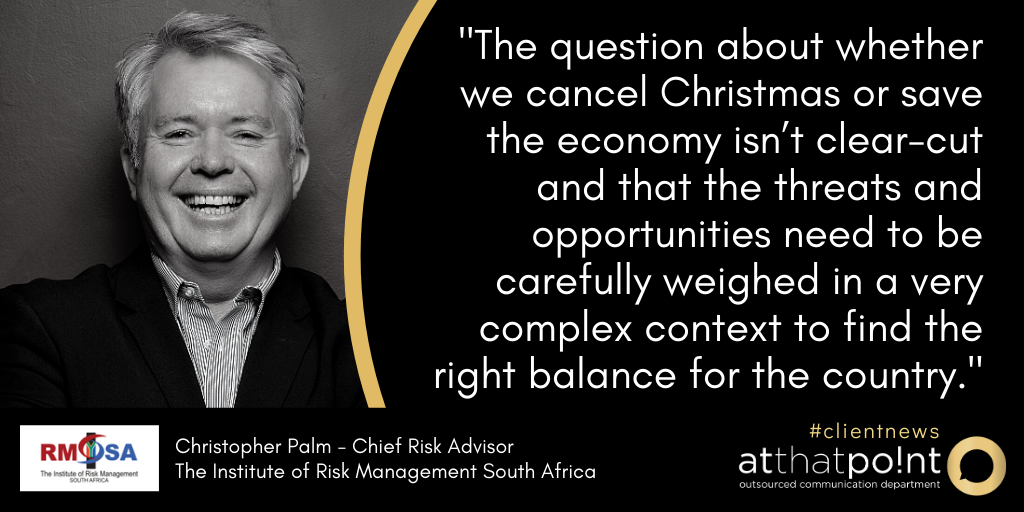
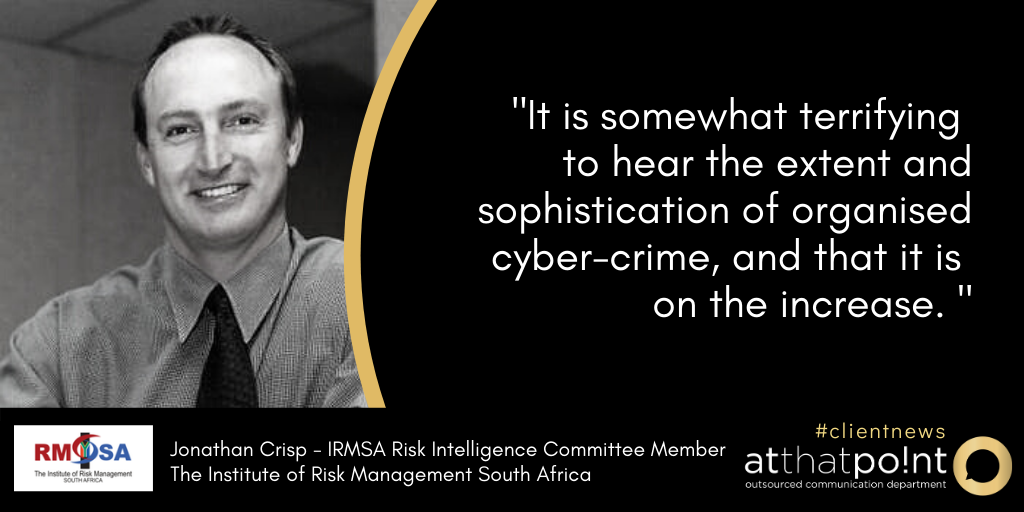
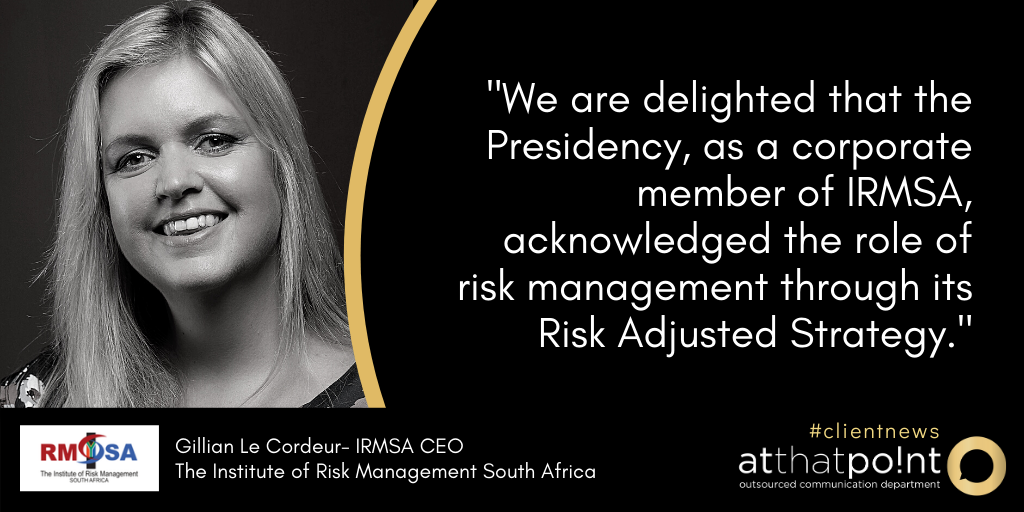
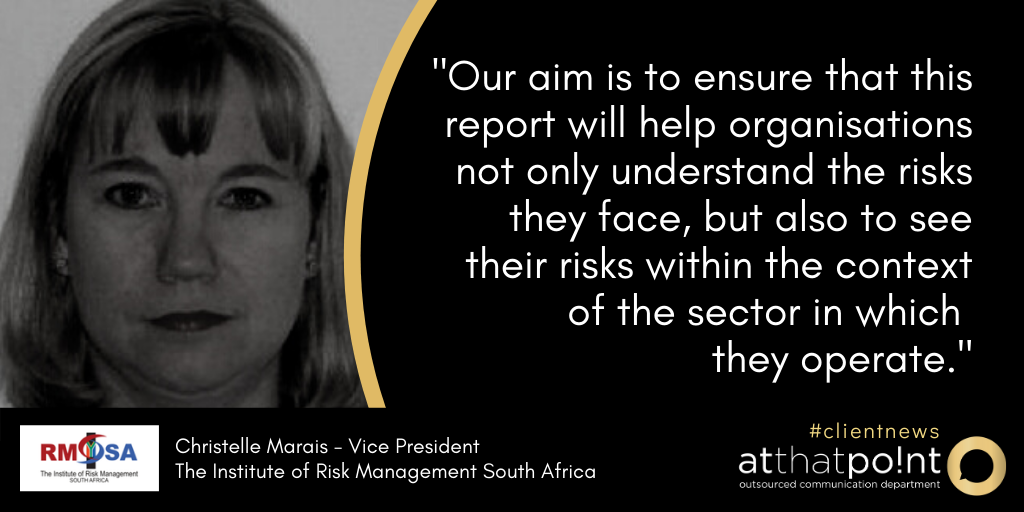
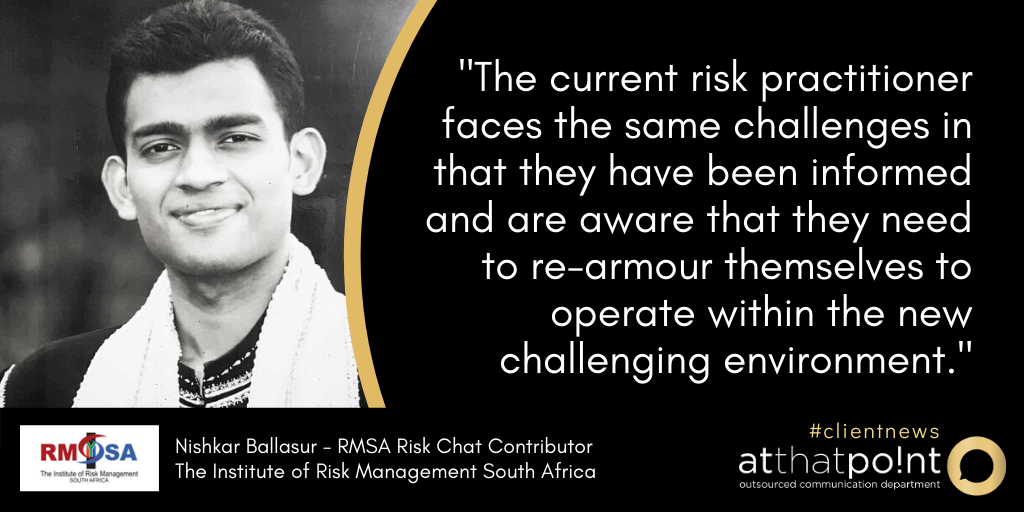
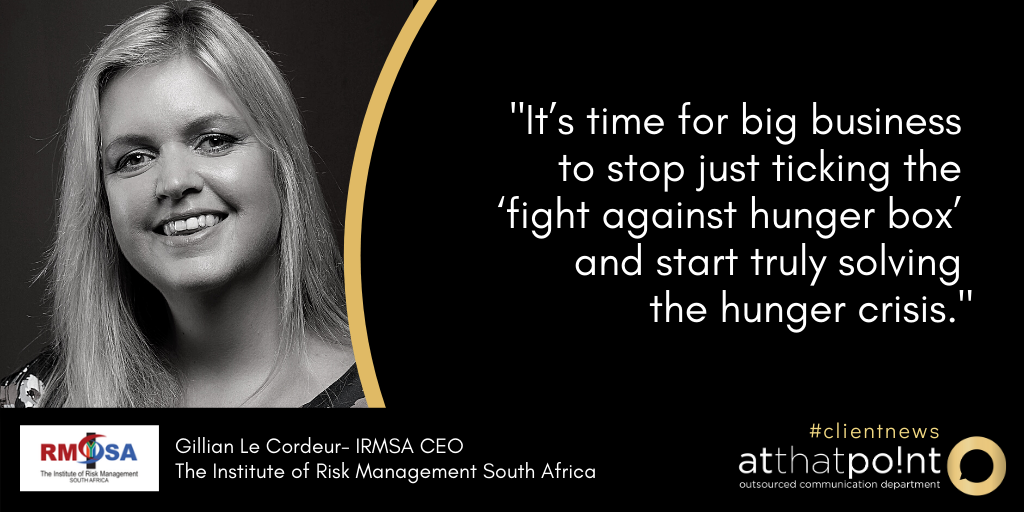
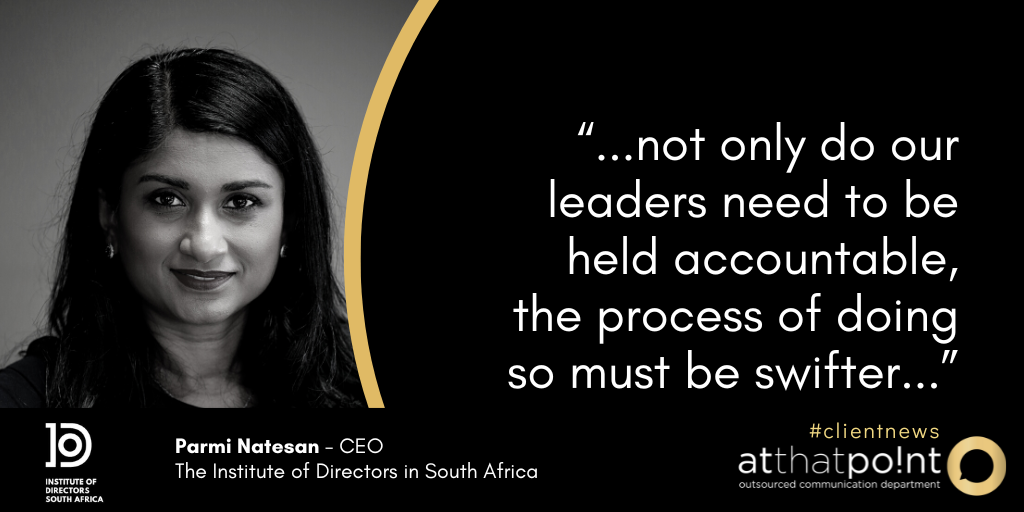
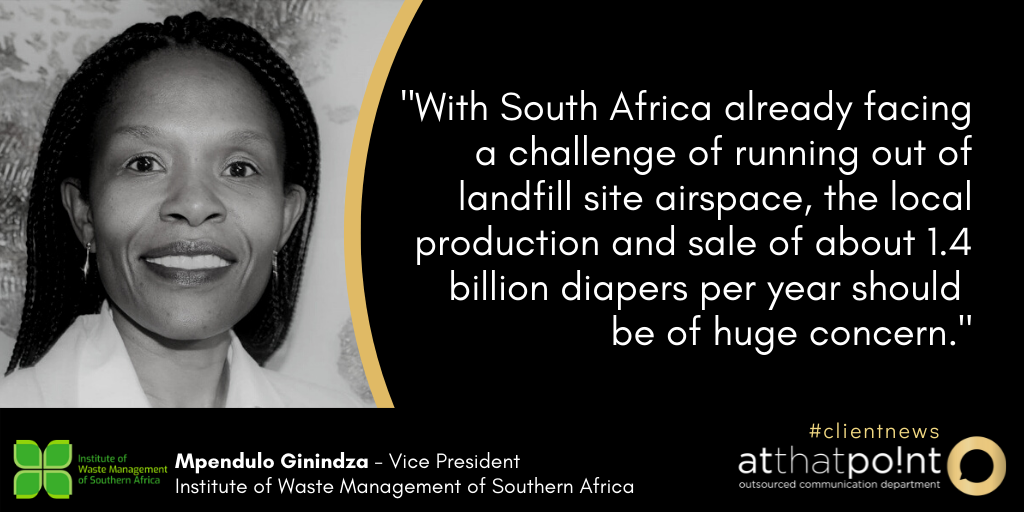
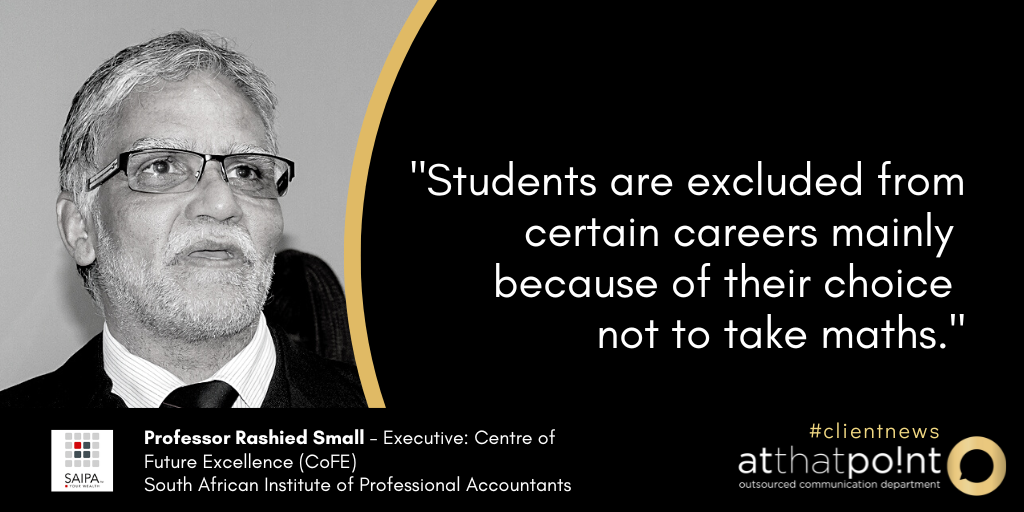
 RSS Feed
RSS Feed